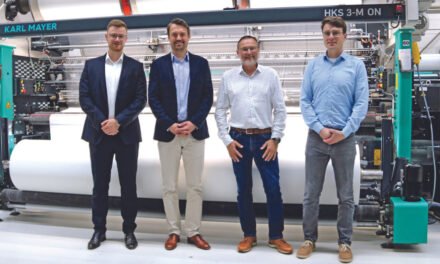 Premium nylon manufacturer Nilit has launched a new nylon 6.6 fibre aimed at improving the recycling potential of knitted fabrics and garments. Described as a new approach to nylon 6.6 circularity, Sensil Flow claims to support the sustainable recycling of yarn, fabric, and, ultimately, apparel to eliminate waste and further reduce apparel’s environmental impact.
Premium nylon manufacturer Nilit has launched a new nylon 6.6 fibre aimed at improving the recycling potential of knitted fabrics and garments. Described as a new approach to nylon 6.6 circularity, Sensil Flow claims to support the sustainable recycling of yarn, fabric, and, ultimately, apparel to eliminate waste and further reduce apparel’s environmental impact.
Ilan Melamed, Nilit General Manager, explained: “Our mission to create a more sustainable textile industry requires a shift in mindset throughout the value chain. “Sensil Flow represents an out-of-the-box approach that directly enables yarn and fabric recycling and lays the groundwork for apparel recycling and is part of a broader circularity mission for Nilit. “Such a significant industry transformation can only be attained through deep partnerships that create innovative products and processes, visionary designs, and a collaborative reconfiguration of the value chain itself.”
Melamed notes that apparel recycling is constrained by the complexity of sorting and separating materials before they can be recycled back to their original components with garments made with blended fibres and fabrics being especially difficult to recycle.
The Sensil Flow approach is designed to address these obstacles on multiple fronts. Firstly, the Sensil Flow yarn delivers a mono-component fabric with comfort stretch that can be considered as an alternative to elastane in certain end uses.
Engineered to provide inherent elasticity and recovery properties, it is said to create comfortable, stretchable performance fabrics for the casual and lifestyle segments that have excellent colour absorption and 3D effects while at the same time making post-consumer recycling possible.
The premium nylon 6.6 yarns, fabrics and garments are also said to be easily recycled using a process that requires no additional chemicals and generates minimal CO2 emissions. Moreover, Nilit is partnering with recycling experts to facilitate the efficient recovery and recycling of fabric waste and post-consumer fabrics and clothing that would otherwise end up in a landfill or incinerator.
These partners are expected to create high quality recycled nylon chips that can be reintroduced into Nilit’s nylon fibre spinning process, resulting in high quality outputs, as well as other engineering plastics. Certificates will validate circularity and provide transparency and accountability for partners committed to building a circular textile economy.
Michelle Lea, Nilit’s Chief Marketing and Sustainability Officer added: “According to industry experts, more than 90 million tons of apparel end up in landfills each year. “Only about a fifth of discarded clothing is reused or recycled. The Sensil Flow approach eliminates waste throughout the production chain and enables brands to design apparel that lasts longer and, at the end of an extensive life, can be more easily recycled.”





















